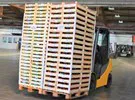 For more than a year and a half, a silent diplomatic crisis has poisoned relations between France and Morocco and impacted Moroccan agricultural exports to Europe. In the midst of this crisis, the French government has used Schengen visas as a sanction tool against Morocco accepting only 50% of acceptable visas. This has impacted, among other industries, the transportation of agricultural exports.
For more than a year and a half, a silent diplomatic crisis has poisoned relations between France and Morocco and impacted Moroccan agricultural exports to Europe. In the midst of this crisis, the French government has used Schengen visas as a sanction tool against Morocco accepting only 50% of acceptable visas. This has impacted, among other industries, the transportation of agricultural exports.
On December 16, 2022, the French Minister of Foreign Affairs, on a visit to Morocco, announced the resolution of the crisis and the restoration of normal consular relations. More than a month after this announcement, has this problem been resolved? What has been its impact on agricultural exports? How does it relate to the increase in transport prices, and therefore on consumer prices of fresh produce? Mr. Mourad Erraguragui, Vice President of the Moroccan Association of Intercontinental Road Transport (AMTRI), answers these questions.
First, Mr. Erraguragui reminded us that France was not the only actor in the visa crisis. "We have faced this problem with other European consulates, including Spanish consulates that receive the majority of applications from truck drivers due to geographical proximity." The representative of Moroccan transporters did not comment on this supposed arrangement between France, which has officially admitted the use of visas as sanctions, and the other European governments, merely calling the coincidence "strange".
 Today, the AMTRI claims that the same problem still persists, more than a month and a half after the official announcements of its resolution by the French government. Mr. Erraguragui explained: "Still today, this harmful situation is present. The processing time for visas often reaches 40 days, so in the end, 70% of the applications by truck drivers are refused. This means the immobilization of 70% of our manpower and our means. This situation causes financial losses and a shortage of drivers. In the end, the whole chain suffers, from the producer to the consumer".
Today, the AMTRI claims that the same problem still persists, more than a month and a half after the official announcements of its resolution by the French government. Mr. Erraguragui explained: "Still today, this harmful situation is present. The processing time for visas often reaches 40 days, so in the end, 70% of the applications by truck drivers are refused. This means the immobilization of 70% of our manpower and our means. This situation causes financial losses and a shortage of drivers. In the end, the whole chain suffers, from the producer to the consumer".
"Even when the visa application is accepted, it does not exceed 90 days, and as soon as the driver receives his visa, he starts a new application due to the exorbitant waiting time, not to mention the fees paid for each application, which are not refunded if the visa is denied".
AMTRI has rung the alarm bell several times during the year and has met with representatives of Spanish consulates. The results are mixed "After these meetings, the situation has been improved in some consulates, but is not entirely resolved. At the consulates located in Agadir, where a majority of transporters of agricultural products apply for visas, the situation is more than alarming and has been so far".
The result is a shortage of drivers, and therefore less freight, more demand than supply and increased transport costs: "Everyone is penalized, said Mr Erraguragui, The carriers who spend their time looking for drivers and following the visa processes, the exporters who see their transport costs increase, and the final consumer who sees the price on the shelf increase, not to mention the human situation of the drivers themselves. Drivers can't get the chambers of commerce to intervene with the consulates, as in other economic sectors. We try to fulfill this role but the consuls are not equally responsive."
Mr. Erraguragui concludes: "The situation is very harmful, with no answers from any side. We are simply waiting for the consulates to receive instructions from their governments to return to normal operation, so this thorn will finally be removed from the feet of the transporters."
 While the visa crisis contributes to the increase in transportation costs, it is not the only reason. The international geopolitical situation -of which the visa issue is a part- has been worsening since the pandemic and is the main reason for the increase in transportation costs, according to Mr. Erraguragui.
While the visa crisis contributes to the increase in transportation costs, it is not the only reason. The international geopolitical situation -of which the visa issue is a part- has been worsening since the pandemic and is the main reason for the increase in transportation costs, according to Mr. Erraguragui.
"Fuel makes up more than 30% of the transporters' expenses, and energy prices at the global level are out of control, due to all the conflicts and geopolitical tensions that the world is currently experiencing". To exporters who expect a return to the norm, i.e. pre-pandemic price levels, "that time has passed. Unfortunately, costs will not return to that level," Erraguragui said. Should they expect prices to stabilize soon? "If some variants are not controlled, including fuel costs and the visa issue, it will only get worse in the coming months," said the transporters' representative.
To help stabilize prices, AMTRI advocates for legal reform in Morocco to index road transport prices to fuel prices. "This will protect transporters and exporters from fuel price fluctuations, but it should be noted that if there is an increase, it will be charged to the consumer. This reform is on the government's agenda. The decision has been made and its implementation is imminent."
For more information:
Mr. Mourad Erraguragui
Moroccan Association of Intercontinental Road Transport (AMTRI)
Tel: +212539340706 / +212539321716
Email: [email protected]
www.amtrimaroc.com
